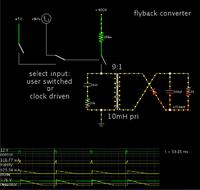Astrid
Full Member level 3

- Joined
- Jul 11, 2011
- Messages
- 152
- Helped
- 4
- Reputation
- 8
- Reaction score
- 3
- Trophy points
- 1,298
- Activity points
- 2,492
Hello , I have idea make switching power supply with variable output voltage , for example 2-50V 100W.
For simplicity, let's say we used TOP271 from TOPSwitch family.
On picture is design for 50V 3A PS designet with TOP271, with whom I replaced one winding 12V from an external source .If in to voltage divider place variable resistor will be easy change output voltage.
The question is how to deal with transformer to achieve the widest possible voltage regulation and power transmission?
Do you know of a sample solution or appnote on a similar switch mode power supply?
The fact that components must be designed for the maximum voltage (50V) and max current (say 12A) perhaps goes without saying

For simplicity, let's say we used TOP271 from TOPSwitch family.
On picture is design for 50V 3A PS designet with TOP271, with whom I replaced one winding 12V from an external source .If in to voltage divider place variable resistor will be easy change output voltage.
The question is how to deal with transformer to achieve the widest possible voltage regulation and power transmission?
Do you know of a sample solution or appnote on a similar switch mode power supply?
The fact that components must be designed for the maximum voltage (50V) and max current (say 12A) perhaps goes without saying


